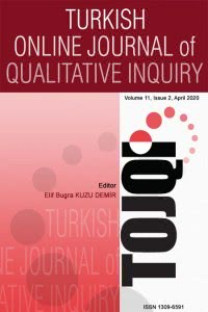Applicability of CLT and Postmethod Pedagogy in Iranian Context of ELT: Expert Teachers’ Perspectives
İngilizce Öğretimine (İÖ) yönelik tüm yöntemler ve yaklaşımlar ele alındıktan sonra, günümüz 21.YY'da İÖ'ne yönelik İletişimsel Dil Öğretimi (İDÖ) ve Yöntem-Sonrası Durum olmak üzere tartışmalı iki farklı güncel yöntem bulunmaktadır. Bu yöntemlerden ilki yöntem çağına ait olarak ele alınırken ikincisi yöntemlerin ötesine geçen bir inanışın çıktısı olarak ele alınmaktadır. Bu çalışma İran'da İÖ'ndeki yaygın ana akımı incelerken, bu bağlamda İÖ'nin en tercih edilen yöntemini keşfetmeyi amaçlamaktadır. Güncel tartışmalara ilişkin alanyazın derinlemesine incelendikten sonra araştırma, gözlem ve yarı-yapılandırılmış görüşmeleri içeren nitel araştırma yöntemi ile desenlenmiştir. Araştırmanın katılımcılarını İran'da tanınmış beş farklı öğretim kurumunda görev yapmakta olan alanında deneyimli beş İngilizce öğretmeni oluşturmaktadır. Bu çalışmanın bulguları öğretmenlerin kendi öğretim stillerini anlamalarına yardımcı olacaktır. Ayrıca çalışma, sözü edilen bu özel bağlamda hangi İÖ yönteminin seçileceğine ilişkin nedenleri belirlemede karar vericilere ve öğretmenlere yol gösterecektir. Buna ek olarak çalışmada, öğretmen eğitimi programlarına yönelik bazı pratik uygulamalar önerilmektedir
İran Bağlamında İngilizce Öğretiminde İletişimsel ve Yöntem-Sonrası Dil Öğretim Yöntemilerinin Uygulanabilirliği: Deneyimli Öğretmenlerin Bakış Açıları
After all the methods and approaches of English Language Teaching (ELT) have been through, today in 21st century there are two current controversial ways of English language teaching named as Communicative Language Teaching (CLT) and Postmethod pedagogy with the former labeled as being an approach belonging to method era and the latter an outcome of the belief in moving beyond the methods. This paper is concerned with the common mainstream of ELT in Iran and aimed to explore the preferred way of English language teaching in this context. After a careful review of literature regarding the present debate, the study adopted a qualitative research design including observation and semi-structured interviews. The participants of the study were five experienced English language teachers teaching at five well-known language institutes in Iran. The findings of this study help teachers’ self-understanding of their teaching styles. Additionally, it helps decision makers and teachers to know the reasons behind choosing specific ways of ELT which work better in this particular context. Moreover, some practical implications are suggested to teacher education programs
___
- Akbari, R. (2007). Reflections on reflection: A critical appraisal of reflective practices in L2 teacher education. System, 35(2), 192-207.
- Akbari, R. (2008). Postmethod discourse and practice. TESOL quarterly, 42(4), 641-652.
- Bell, D.M. (2003). Method and postmethod: Are they really so incompatible?. TESOL quarterly, 37(2), 325-336.
- Bell, D.M. (2007). Do teachers think that methods are dead?. ELT journal, 61(2), 135-143.
- Borg, S. (2003). Teacher cognition in language teaching: A review of research on what language teachers think, know, believe, and do. Language teaching, 36(02), 81-109.
- Brown, H.D. (2000). Principles of language learning and teaching (4th ed.).White Plains, NY: Pearson Education.
- Brown, H.D. (2001). Teaching by principles: An interactive approach to language pedagogy (2nd ed.). White Plains, NY: Prentice Hall Regents.
- Chastain, K. (1988). Developing second language skills: Theory and practice (3rd ed.). New York: Harcourt Brace Jovanovich Publishers.
- Day, R. (1993). Models and the knowledge base of second language teacher education. University of Hawai'i Working Papers in English as a Second Language 11 (2).
- Dörnyei, Z. (2007). Research methods in applied linguistics: Quantitative, qualitative, and mixed methodologies. Oxford: Oxford University Press.
- Hymes, D. (1972). On communicative competence. In J. B. Pride and J. Holmes (eds.), Sociolinguistics (pp. 269-93). Harmondsworth: Penguin.
- Kaimvand, P.N., Hessamy, G. R., & Hemmati, F. (2016). Postmethod Education: Its Applicability and Challenges in Iran. International Journal of Asian Social Science, 6(1), 21-34.
- Kumaravadivelu, B. (1994). The postmethod condition: (E)merging strategies for second/foreign language teaching. TESOL quarterly, 28(1), 27-48.
- Kumaravadivelu, B. (2001). Toward a postmethod pedagogy. TESOL quarterly, 537-560.
- Kumaravadivelu, B. (2006). Understanding language teaching: From method to postmethod. Routledge.
- Kumaravalivelu, B. (2012). Language teacher education for a global society. New York: Routledge
- Larsen-Freeman, D. (1986) Techniques and principles in language teaching. Oxford: Oxford University Press.
- Loomba, A. (2005). Colonialism-Postcolonialism. Oxon: Routledge.
- Mardani, M., & Moradian, E. (2016). Postmethod pedagogy perception and usage by EFL teachers and learners and its limitations, symbols, and viewpoints. International Journal of Language Learning and Applied Linguistics World, 11, 75-88.
- Naseri Karimvand, P., Hessamy, G., & Hemmati, F. (2014). The place of postmethod pedagogy in teacher education programs in EFL language centers of Iran. Iranian Journal of Applied Linguistics, 17(2), 59-91.
- Pennycook, A. (1998). English and the discourses of colonialism. London: Routledge.
- Richards, J.C. (1990). The language teaching matrix: Curriculum, methodology, and materials. Cambridge: Cambridge University Press.
- Richards, J.C., & Rodgers, T. S. (2001). Approaches and Methods in Language Teaching (2nd ed.). Cambridge: Cambridge University Press.
- Richards, J.C. (2006) Communicative Language Teaching Today. New York: Cambridge University Press.
- Richards, J.C. (2008). Second language teacher education today. RELC journal, 39(2), 158- 177.
- Safari, P., & Rashidi, N. (2015). A Move Towards Postmethod Pedagogy in the Iranian EFL Context: Panacea or More Pain?. PASAA: Journal of Language Teaching and Learning in Thailand, 50, 95-124.
- Savignon, S.J. (2007). Beyond communicative language teaching: What's ahead?. Journal of Pragmatics, 39(1), 207-220.
- Tajeddin, Z. (2005). A critique of the inception and premises of the postmethod paradigm. ILI Language Teaching Journal, 1(1), 1-14.
- ISSN: 1309-6591
- Yayın Aralığı: 4
- Başlangıç: 2010
- Yayıncı: Prof.Dr. Abdullah Kuzu
